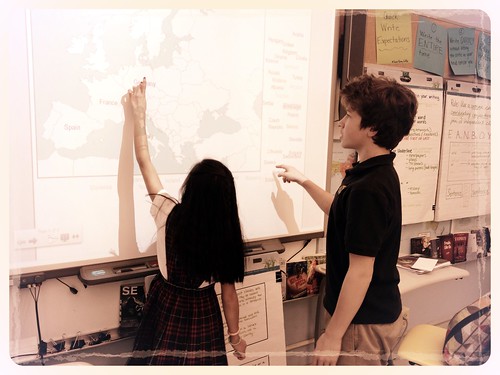When I was in high school, I spent five weeks between 9th and 10th grade living with a family in Salamanca, Spain. My reasons for going were pretty shallow; I thought it would be cool to get a passport and my friends were going. I didn't speak Spanish, so when I finished the books I brought with me, my host family took me to the university bookstore to find books in English. This is how I came to read all of Jane Austen before I was sixteen. At some point I also discovered the International Herald Tribune, and I would buy it every day it was available. I read every single article, even the ones that I didn't understand about how Iraq was mad at Kuwait about something. This was pre-Internet, and the newspaper was my only source of news.
Last year, I decided to have my 8th graders learn all the countries in the world. We didn't learn quite all of them (SO MANY ISLANDS in the Pacific Ocean!), but we did master four continents. Pretty much every kid aced the test. But if the only thing that my students took away from our geography study was the ability to win at trivia, then we failed. Ultimately, finding Mauritania on a map doesn't mean much. Our geography study is only meaningful if it's about more than maps.
Here's the thing: You can buy all the apps and bookmark all the websites, but ultimately, the best way to connect your students to the larger world is for you, the teacher, to care about the larger world. I was able to pick up on the developing stories because I made a concerted effort to read the World section of the newspaper and to pay close attention when they talked about international stories on NPR. This wasn't easy; I spent a lot of time opening Maps on my phone and asking it where Argentina was. (Okay, fine, I did that yesterday. Summer slide doesn't only happen to students.) Instead of letting my mind drift when the radio talked about terrorism in northern Mali, a country that I previously thought was a tropical island, I reminded myself that Mali is in northern Africa. I asked myself what countries bordered Mali, and thought about the implications. When a story came on about Eritrea, I listened.
I modeled this in front of my students. They love CNN Student News; I told them we would always watch when it covered international stories, and that I would ban it forever if it covered the Kardashians. We subscribe to The New York Times Upfront, and when I assign articles for note taking and quizzes, I always pick the international stories. There was a terrible factory collapse in Bangladesh last year; at the end of the week I found a variety of articles and videos online and asked my students to read them and respond via edmodo. I asked them to share new links and to examine what the sources said and didn't say. I asked them if they thought western companies and consumers were responsible for something that happened so far away.
School starts in a little over a month. We're going to take geography quizzes each week, and hopefully I'll find maps so that we can learn all the tiny island nations this year too. But I can't, with perfect accuracy, know where we'll have to pay close attention. We'll make some predictions that first week (Syria, North Korea), but others will be surprises.
A few weeks after I got back from Spain, Iraq invaded Kuwait. Several months later, the United States "liberated" Kuwait. And because I had been reading about Iraq and Kuwait all summer, I knew a little bit more about what was going on and why. This is what I hope for my classroom: That because we are paying attention, we'll be looking in the right direction the next time the world changes.
 |
| Geography practice is good bonding time between grades. |
Currently reading: Life, After by Sarah Darer Littman
Why I'm Reading It: I need more books set outside the United States, and this one starts in Argentina.

No comments:
Post a Comment